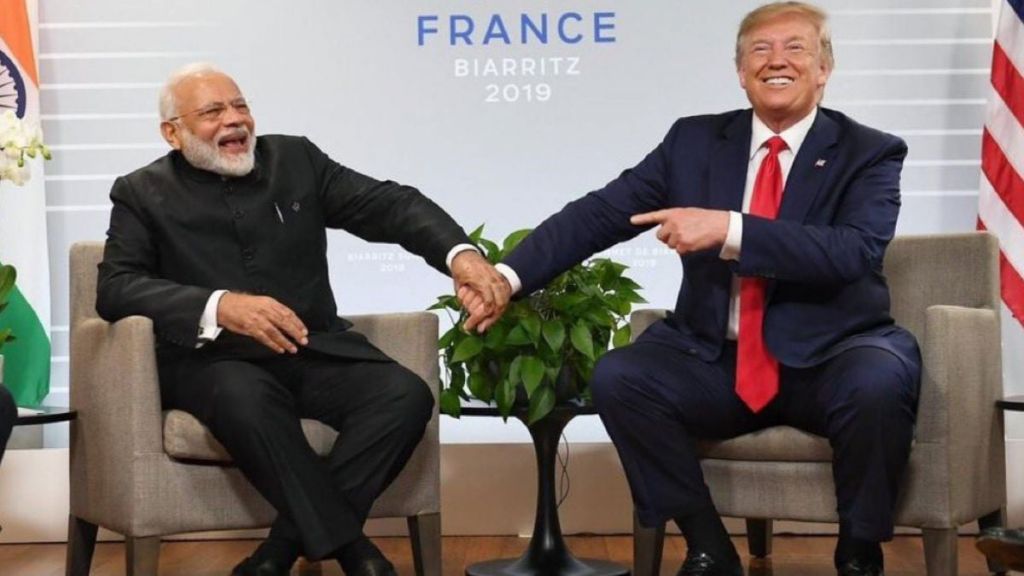
The good news is that New Delhi has had a greater level of comfort with the Republicans than with the Democrats in the last few administrations, starting with President George Bush Jr and his neocons.
Other than that the only thing that can be said with some certainty is that New Delhi will think twice before asking the 47th President of the United States to be the Chief Guest at the Republic Day parade.
The last time he was invited as the 45th President to witness the parade in 2019, he declined leaving diplomats to explain to journalists, anonymously and guardedly, that a man like Trump was not cut out to sit for long hours watching mostly Russian armoury roll down what was then called the Rajpath.
A man like Trump, who will come into the White House with his country emphatically behind him five years later, will probably be more impatient, mercurial, and chaotic in terms of processes and decision making, which makes predictions a bit of a mug's game.
How do you spin the fact that Trump practically held his tongue when the citizen's law clashes occurred in Delhi, almost overshadowing his visit, and yet came out strongly against attacks on minorities in Bangladesh?
Diplomats will probably explain it as personal chemistry between Prime Minister Modi and President Trump, who took the trouble of attending Modi's rally in Houston in 2019.
That friendship did not prevent Trump from ending India's Preferential Trade Status under the Generalised System of Preferences (GSP) on the ground that India had not assured United States that it would provide “equitable and reasonable access to its markets.”
Trade matters will continue to be iffy, and acted upon depending on whether it is to do with Harley Davidson motorcycles or American products and goods where Trump feels India levies very high taxes.
On top of the pressures to prise open the market that Trump is sure to exert, New Delhi has to factor the formidable duo of Trump and his biggest backer, Elon Musk, wielding their political and economical heft. There will be no free lunches.
Trump ramped up military to military co-operation when he approved a deal allowing sharing of geospatial locations that helps Indian drones and missiles function with much greater accuracy. He placed New Delhi at par with America's allies across the Atlantic in terms of strategic trade, which meant opening the doors to technologies India couldn't hitherto access.
Trump primed the Quad, breathing life into its moribund existence as well, drawing the bead on China in more ways than one -- a trend that could well continue.
Ties with the United States have more heft now than five years ago, the bilateral ties on a surer footing, and the world has moved from where it was previously. Yet, India and Pakistan are frozen in time, and someone like Trump, given to grandstanding and extravagant gestures will not shy away from claiming credit where credit is due. He did so for separating India and Pakistan over the Balakot strike.
Trump was in Hanoi after an unthinkable outreach to North Korean President Kim when New Delhi struck Pakistan. “We have, I think, reasonably attractive news from Pakistan and India. They’ve been going at it, and we’ve been involved in trying to have them stop. And we have some reasonably decent news. I think, hopefully, that’s going to be coming to an end. It’s been going on for a long time — decades and decades. There’s a lot of dislike, unfortunately. So we’ve been in the middle, trying to help them both out and see if we can get some organization and some peace. And I think, probably, that’s going to be happening.”
While once again the attacks in Jammu and Kashmir are on the rise and is a cause for strategic worry, it is more the second order consequences of Trump's action that could affect India. Consider, after Trump initiated the withdrawal of US forces from Afghanistan, New Delhi was without a leg to stand on in that country where it had poured a lot of money and resources, riding piggyback on the Americans.
The second order consequences could come to bite India if Trump trains his guns on Iran, for example where New Delhi and Washington have different perceptions. He has previously walked out of a deal with Iran, and now with the war in West Asia, it is not clear how he is going to move. What is clear is his indulgence on Israel is much greater than the 46th President Biden's ill-concealed irritation with Bibi Netanyahu and that cannot be good for Iran.
Where Ukraine is concerned, we do not yet know what kind of conversations have taken place between Volodymyr Zelenskyy and Trump but there is no way he will be able to end the war in a day, as he promised. If Trumps warms up to Putin then New Delhi need not worry. What New Delhi needs to worry is if Trump moves with more speed on the allegations brought forward by the Biden administration on the matter of the alleged assassination attempt on Gurpatwant Singh Pannun or if Trump shows more solidarity with Canada on matters related to this.